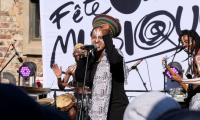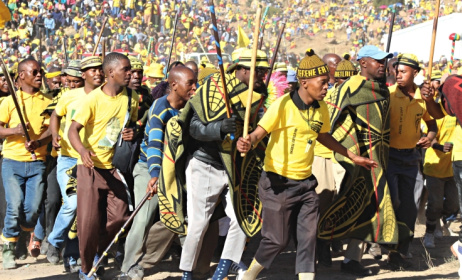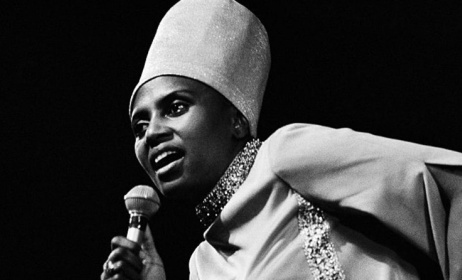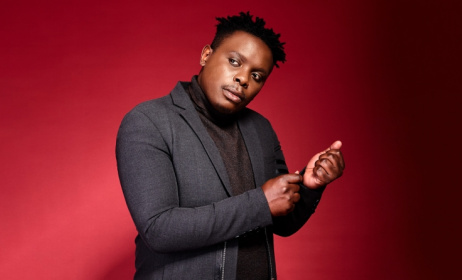What’s going on with the Burundi music industry?
An author and broadcaster of 15 years at the last independent radio station in Burundi, Radio Isanganiro, has over the years through various radio and TV programmes set in motion the careers of many artists in an industry that is far from reaching its full potential.
 Burundian radio journalist Christian Nsavye.
Burundian radio journalist Christian Nsavye.
From negotiating contracts to discovering talent, Christian Nsavye has made a name for himself in the Burundian music industry as a seasoned artist manager and guitarist. He is known for publishing Culture and Politics in Burundi: Protest Music Broadcast on Radio Isanganiro from 2013 to 2015 – a book that features Burundian musician-activists.
Nsavye has also emceed at Bayimba Festival in Uganda, Cotonou Festival in Benin and at the yearly Primus Talent Search in his home country.
Here is what he had to say about the music industry in his beloved country.
MUSIC IN AFRICA: You are highly experienced in working with practitioners in the music industry. Can you let us in on some of the challenges faced by musicians in Burundi?
CHRISTIAN NSAVYE: The biggest challenge is a lack of good management. Artists in Burundi lack people who can broker endorsement deals with cooperates and book them for shows and festivals. It’s ironic that during product launches, companies fly in musicians, yet we have our own local artists. This is because the government has not encouraged corporates to work with local artists. Brima Breweries, which manufactures Primus beer, is the only company that tries to involve local artists in its projects.
The second challenge is a lack of properly equipped recording studios and well-trained sound engineers, which makes it very difficult for artists and producers to be creative. Tied to that is a huge percentage of musicians who cannot afford to make high-quality videos.
A lack of proper music education institutions is another problem. We have people who can sing in Burundi but because there are no schools that train all-round musicians, they lack skills in songwriting, composition and production. The most common training in Burundi is in instrument playing.
Women in music face discrimination and lack support because society does not believe that women can be successful music without engaging in prostitution. They therefore proceed to brand them as immoral. I have no doubt that this norm will continue until the public is able to accept music as a profession that women can be part of.
To conclude, the organisation tasked with representing and protecting artists on copyright-related issues is handicapped. The state has not given it enough funds to execute its mandate. There also exists an association for musicians, Amicale des Musiciens du Burundi (AMP), which is dormant.
Do you mean to say there’s no one responsible for collecting royalties?
Copyright implementation in Burundi is rarely heard of and this is because it has not been given the attention it requires – unlike in Rwanda and Kenya where this aspect is at least implemented. The government in Burundi has mandated two organisations to represent musicians and authors. The first organisation, which I mentioned earlier, is the association of musicians which was relaunched in 2002 after being dormant for years. Unfortunately, this body is unable to execute its roles as it receives little funding from the government and the artists themselves have no money to support it.
The second organisation is the Burundian Office of Copyright and Neighbouring Rights (Office Burundais des Droits d’Auteurs [OBDA]), which was launched in 2005 by President Pierre Nkurunziza. He did this after artists staged demonstrations outside his office demanding for the formation of an organisation that could document and represent their artistic, literary and cinematographic works.
Ironically, very few Burundians have declared and registered their work. From my experience, artists are sceptical about becoming members because they lack a clear understanding of the role of OBDA. Most of them believe that if they join it they’ll be taxed.
You spoke earlier of artists having talent but no skills. Are there no institutions of higher learning in Burundi?
No. What we have are temporary initiatives set up by churches where artists are taught how to play guitar and the piano. There are also about five centres established by NGOs for kids to get vocal coaching and instrument playing lessons. There is one music school in Gitega town that teaches basic music education after which students graduate and get licences to do music. The school is called Institut de Musicology de Gitega, and was started by Musenyeri Justin Baransananukiye.
What about gender representation in the music industry?
Let me start by noting that last year Nkurunziza banned women from taking part in the country's famous traditional drumming rituals, which have been on the United Nations Educational, Scientific and Cultural Organisation's [UNESCO’s] intangible cultural heritage list since 2014. This was a major setback. I have been at the forefront in supporting women in music. A while back I was involved in a project with musician and fellow journalist Edwige Mbonimpa, where we organised shows in Bujumbura for six months and only invited females to perform. This was in support of the few women doing music.
So to answer your question, women are not well represented, the reason being that many of them are scared since society has branded this career immoral. They only get respect and love from society once they become successful and begin to drive cars and set up businesses. There are also very few women because most of them stop doing music once they get married. The most popular female musician who has taken our music abroad is Khadja Nin who began music in 1992.
Recently, musicians in Tanzania have experienced censorship. Is there freedom of expression for artists in Burundi and are there musicians who are in exile?
I’ve been following the Tanzanian issue on the Internet. As a professional I agree that censorship is necessary but it needs to be done by an independent body. In Burundi, there are countless artists who are either in exile or are often arrested for singing about political issues or scrutinising the government, such as Lion Story and Cedric Bangirinama.
Before 1993, musicians were free to sing about any topic. During the civil war, from 1993 to 2005, artists were not free because at the time certain topics were very sensitive to talk about. After the war they were free once more to sing about any issues. However, the most common songs at the time were patriotic and freedom songs.
Currently, as much as there is no censorship, musicians sing about everything apart from politics. During the 2005 and 2010 general elections, musicians took part and sang for political parties but this did not happen during the 2015 elections and I don’t think they will take part in the 2020 campaigns either.
There is fear so everyone is minding their own business. We’re holding a referendum to decide on the changes in the Constitution in May but so far no artist seems to be interested in the campaign or even civic education.
I should also mention that radio and TV stations are not allowed to play politically charged songs. A directorate was issued for all broadcasters to delete such music. In 2016, we were obliged to shut down one of our music programmes, Karadiridimba, for about a month because the High Press Council (Conseil National de la Communication) disagreed with the content of one song that was played.
As we speak, the AMP is the body that decides what songs are of 'good artistic quality' and which ones are not.
What does the future of the music industry in Burundi look like?
For a long time private companies have not supported artists except for Brima Breweries. I believe this will certainly change and local musicians will be able to be appointed brand ambassadors. In terms of infrastructure, more than 10 years ago there was no sound system in the country. For the past three years we’ve been hiring sound systems from Tanzania. As for the future, I believe we’ll be able to have our own.
As of now at least three or four artists are signed to good record labels in the region. This number is bound to also improve with well-equipped studios being set up by professionals. Once we are able to make good quality music, we will automatically get more collaborations from the region and beyond.


































Comments
Log in or register to post comments